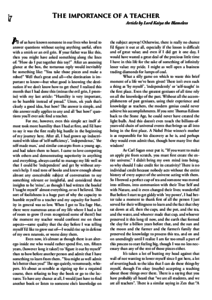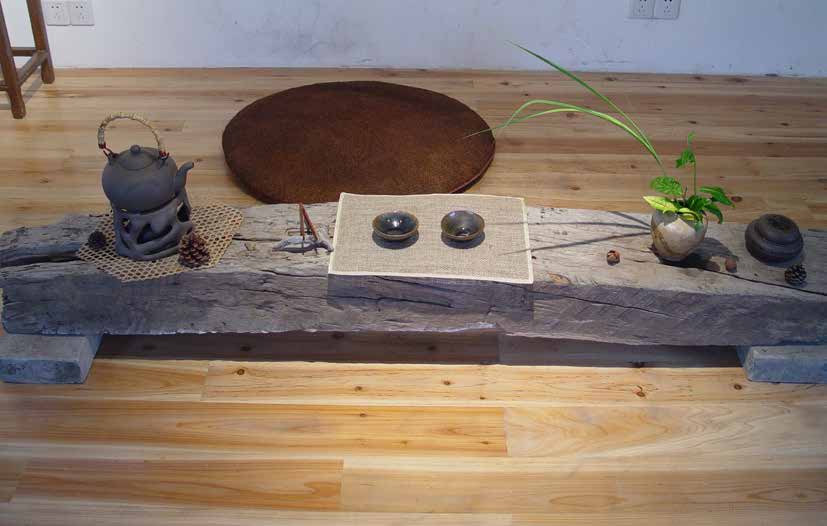
 |
|
All of us have known someone in our lives who loved to answer questions without saying anything useful, often with a smirk or an evil grin. If your father was like this, then you might have asked something along the lines of: "How do I put together this toy?" After an assessing glance at the box, the torturous reply would inevitably be something like: "You take those pieces and make a robot!" Well that's great and all - the destination is important to know - but what good is knowing the destination if we don't know how to get there? I realized this month that I had done this (minus the evil grin, I promise) with my last article: "Humility is very important, so be humble instead of proud." Umm, ok yeah that's clearly a good idea, but how? The answer is simple, and this answer really applies to any and all 'but how?' questions you'll ever ask: find a teacher.

For me, however, even this simple act itself almost took more humility than I had at first, and I'd have to say it was the first really big hurdle in the beginning of my journey here. After all, I had grown up indoctrinated with ideas of 'self-sufficiency', 'independence,' 'the self-made man,' and similar concepts from a young age, and had taken them to heart. I came to love competing with others and demonstrating superiority in anything and everything, always careful to manage my life well so that I could be 'independent' and get by without anyone's help. I read tons of books and knew enough about almost any conceivable subject of conversation to say something relevant or insightful, and considered these insights to be 'mine', as though I had written the books! I 'taught myself ' almost everything, or so I believed. This sort of foolishness is a huge part of why the capacity to humble myself to a teacher and my capacity for humility in general was so low. When I got to Tea Sage Hut, there were numerous areas of my life where I had a lot of room to grow (I even recognized some of them!) but the moment my teacher would confront me on those aspects - same quality that the day before I was telling myself I'd like to grow out of - I would rise up in defense of my own neurosis, or worse deny them.
Even now, it's almost as though there is an alterego inside me who would rather spend five, ten, fifteen years, (however long it takes!) to 'figure it out by myself ' than to bow before another person and admit that I have something to learn from them. "You might as well admit he's better than you!" The ego quietly, venomously, whispers. It's about as sensible as signing up for a required course, then refusing to buy the book or go to the lectures. To have any chance at all, I would just have to find another book or listen to someone else's knowledge on the subject anyway! Otherwise, there is really no chance I'd figure it out at all, especially if the lesson is difficult and of great value; and even if I did get it one day, I would have wasted a great deal of the precious little time I have in this life for the sake of something of infinitely lesser value: my pride. I might as well open a business trading diamonds for lumps of coal.

What a silly game on which to waste this brief moment of a life we've been given! There isn't even such a thing as 'by myself ', 'independently' or 'self-taught' in the first place. Even the greatest geniuses of all time rely on all the knowledge of the past. Without all the accomplishments of past geniuses, using their experience and knowledge as teachers, the modern genius could never achieve his accomplishments. If you sent Thomas Edison back to the Stone Age, he could never have created the light bulb. And this doesn't even touch the billions-ofyears-old chain of universal events that brings us all into being in the first place. A Nobel Prize winner's mother is as responsible for his discovery as he is, and perhaps they would even admit that, though how many live that wisdom?
As Carl Sagan once put it, "If you want to make an apple pie from scratch, you must first create the entire universe." I didn't bring my own mind into being, so why should I take credit for its creativity? There is no individual credit because nobody acts without the entire history of every aspect of the universe acting with them. So I brewed a perfect cup of tea and someone was moved into stillness, into communion with their True Self and with Nature, and it even changed their lives; wonderful! But before I start to get giddy with 'my power', I had better take a moment to thank first of all the person I just served for their willingness to learn and the fact that they sat down at all, then the cups, and the pot, and the tea, and the water, and whoever made that cup, and whoever preserved it this long til now, and the earth that formed the clay for a billion years before that, and the sun and the moon and the farmer and the farmer's family that preserved the knowledge to process this tea, and on and on unendingly until I realize I am far too small a part of this process to start feeling big, though I was no less necessary than any of the rest of those pieces either.
It's taken a lot of butting my head against that wall of not wanting to lower myself since I got here, a lot of reverting back to the idea that I can do these things by myself, though I'm okay (maybe) accepting a teaching about those things over there. There is a saying that you have probably all heard that "we are all students, and we are all teachers". There is a similar saying in Zen that "Amaster can be a student of all." Ironically, these quotes are favorites of both the worst students and the best students, but for different reasons. When I got here, I fell into the former category: to me, quotes like these were good expressions of exactly why I didn't need a teacher at all.

"That's right," I thought. "I am already a teacher, I teach myself things all the time, what do I need a master other than myself for?" But the truth is my life was a huge list of people with whom I was and was not willing to learn. Those I listened to and those I didn't listen to, all of which really amounts to the same thing as if I were reading a book and circling all the parts that enhanced the beliefs I already had while at the same time denouncing the rest of the book. Then, on top of that, I was taking credit for those ideas! In line with the tendency to believe I could do everything on my own, I was copping out of bowing to a teacher by pointing to these catch lines. But I might as well have said, "I'm going to be a master blacksmith today." It takes years of hard work and apprenticeship to accomplish such mastery. And there is no mastery of anything without first mastering our pride. It was with this realization, that I didn't really have what it took to be a student just yet, and a recognition of the prideful and unproductive way I was really relating to all those potential teachers, that I finally realized the importance of choosing one teacher, one relationship, in which I was going to practice bowing all the time. Even if a lesson is something I don't need to work on, even if it is something I have already achieved, it's irrelevant to waste time considering; that simple act of practicing humility and the opportunity to practice it are of tremendous, inestimable value in truly learning future lessons as well. And now I am finding that it is not only influencing my ability to accept and learn the lessons from the teacher I've made an intention with, but increasingly all the infinite lessons that are available from the other teachers in my life are growing more available and meeting less resistance as well. The more and more I surrender myself to the process of being a student in this one relationship, the more I practice and keep my commitment to not deviate into resistance and the more that habit is spilling over into my other relationships, to the benefit of all.
Let's face it; how many of us can say that there is not one single person in the world, not one person who can push a button that makes us push back? Probably, there are more such people than not. How many relationships and situations arise in your life, even on a daily basis, where you react without thinking about it and are unconscious, for at least a few moments, if not hours or days, instead of looking for the lesson this moment is trying to teach you and experiencing gratitude toward that person or situation rather than resistance?
The natural question, then, is how to choose a teacher? If everyone and everything can be a teacher, and I need to choose one to practice with before I can benefit from all of them, who should it be? Well, for one thing, it should probably be someone that has an intention tosomeone who only teaches you 19 teach you, rather thanwith experience and knowledge, as incidentally. Someone well as the desire to see you grow. Yes, you could choose a person in your life who just happens to be blessed with the ability to push your buttons and make a decision to learn about yourself from that interaction. But then you have only yourself to answer to. Nobody is going to be there to support you or warn you when you deviate or make a mistake; no one to encourage you and keep you motivated. Not to mention, if you find a teacher who intends to teach you, then it is far easier to maintain practice simply because you know ahead of time that this person is only pushing your buttons because it's in your own interest, never out of a genuine desire to hurt you. An intentional teacher pushes you because they love you, so it's not as difficult to remember to be grateful as it is when someone is trying to hurt you. This is the difference between a "teacher" and a "teaching."
There is a saying that "when the student is ready, the master appears." If you are truly ready for it, you will find that the perfect teacher for you is already readily available. They've probably been knocking on your door for some time, and will continue to do so in one form or another your whole life until you recognize them. I missed out on the first such opportunity in my life, my father. A master carpenter, he often sought to teach me what he knew, but I had a dozen reasons why I'd rather do nothing instead, and here I am a decade later only just now learning many of the same lessons through tea I could have learned then through carpentry. And that's the point: all the time wasted in refusing to have a teacher doesn't accomplish anything besides putting off the moment when you will accept one and get to work. In the meantime, you have to live with the unpleasantness of all those unlearned lessons in your life, so in fact the easiest thing you can do is to start working!
I suppose that ultimately, my advice is that if you have a teacher, first recognize that you indeed need the water of wisdom in your life. Then start digging your well wherever you are with the shovel you already have. Beyond the tendency to deny the need to dig in the first place, there is a tendency to criticize the shovel and convince ourselves that we have to go find a different shovel to dig with. But this is just the same game we've been talking about dressed up in another outfit. "I am ready to be a student, but the trouble is all these teachers are no good," goes the reasoning, when in reality any of the shovels will take you down to the water if you just stop making excuses. The fact of the matter is that we all need that water in order to live, so start digging; the sooner you dig, the sooner you'll quench your thirst!